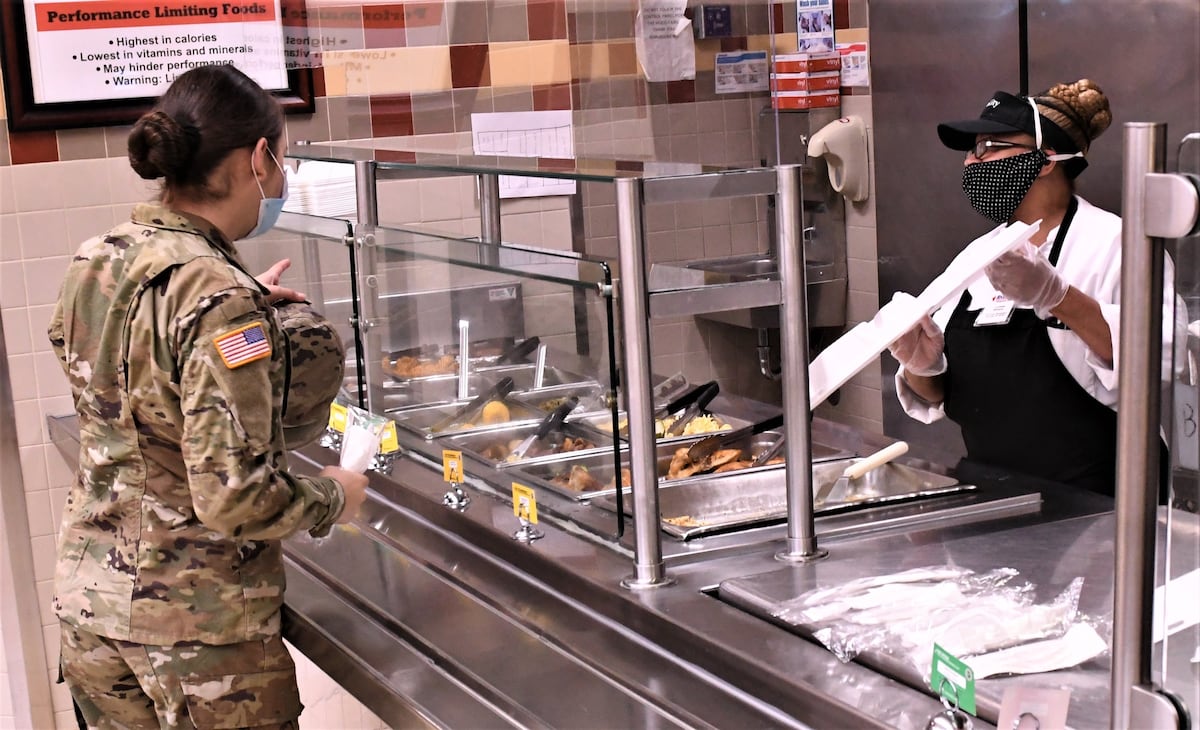College-style dining facilities coming to Army bases

The U.S. Army has signed a contract to create dining venues at several installations aimed at revamping soldiers’ culinary experience, the service announced Sept. 30.
The Army Nonappropriated Fund Contracting Office at Installation Management Command, G9, awarded Compass Group USA a concession contract Aug. 28 to create college campus-style facilities at Fort Bragg, North Carolina; Fort Stewart, Georgia; Fort Carson, Colorado; Fort Hood, Texas; and Fort Drum, New York.
“The Army is focused on creating a positive seismic shift in food service operations,” Lt. Gen. Chris Mohan, Army Materiel Command deputy commanding general and acting commander, said in a release. “It’s all about taking care of the warfighter by increasing healthier, more easily accessible food options that are convenient to them.”
The contract is for five years, with five one-year extension options, the Army said.
RELATED
The Army outlined its goal to revamp dining halls and modernize food service in a request for proposal released at the beginning of the year, Army Times previously reported.
That proposal outlined a plan to build facilities similar to college campus cafeterias that offer traditional dine-in options, online ordering, healthy food and food delivery.
The service specifically called for privately contracted chefs and kitchen staff to accomplish specific nutritional goals that include food that’s sustainably sourced, local, organic, humane and contains no antibiotics or hormones.
Compass Group USA, however, has been the subject of at least one legal complaint. The company agreed to pay $6.94 million to settle a lawsuit over the company charging customers’ credit cards more than the displayed price on their vending machines between 2014 and 2025, according to court documents.
Meanwhile, the initiative is one of several aimed at creating a campus-style dining experience on Army bases. In August, the service piloted the Flexible Eating and Expanded Dining initiative, which allowed soldiers at Fort Hood to use meal entitlements at Army-approved food vendors, Army Times previously reported.
“We haven’t been doing a good job on food, and we’ve been getting, rightfully so, in a lot of cases, getting beat up by Congress or by soldiers who then have gone to Congress,” Mohan said in an interview with Defense News.
On-post dining has long faced criticism from troops. In January, for example, Fort Carson soldiers took to the Yelp-style app Hots&Cots to complain about small portions and unappetizing meals at the base’s dining facilities.
Reviews told tales of warm sushi, lackluster protein offerings, and excessive wait times to get their food.
“The food is small, corn barely bigger than my pinky … rice overcooked, bread hard,” one soldier posted. “Terrible vegetable spread.”
But the service has worked over the last three years to shift to campus-style dining facilities, Mohan said.
With the new Compass contract, dining venues will be upgraded to include a minimum of five food stations at each, a professional chef who will manage the facility and a dietitian on staff, according to Mohan. Individuals in unaccompanied installation housing will have access to dining venues with extended hours, the service said.
At the new facilities, soldiers will use their military ID cards to access food, while civilians will pay out of pocket. In the future, soldiers will be able to use their ID card at restaurants on post for select menu items chosen by a dietitian, Mohan said.
Army Materiel Command conducted an overview of the service’s dining experience at 35 installations in 2024, incorporating soldier preferences as part of its research, according to an Army release. AMC relied on focus groups, surveys, and feedback from military personnel for its assessments.
Contractors will be responsible for managing the dining venue and sourcing the food served, and will only be paid for the meals provided to soldiers, the release said.
The first campus-style facility is set to open up at Fort Bragg in January, Mohan said, with Fort Drum, Fort Stewart, Fort Carson and Fort Hood to follow in no particular order.
“We’re really, really pleased,” Mohan said.
Defense News reporter Jen Judson contributed to this report.
Riley Ceder is a reporter at Military Times, where he covers breaking news, criminal justice, investigations, and cyber. He previously worked as an investigative practicum student at The Washington Post, where he contributed to the Abused by the Badge investigation.
Read the full article here









